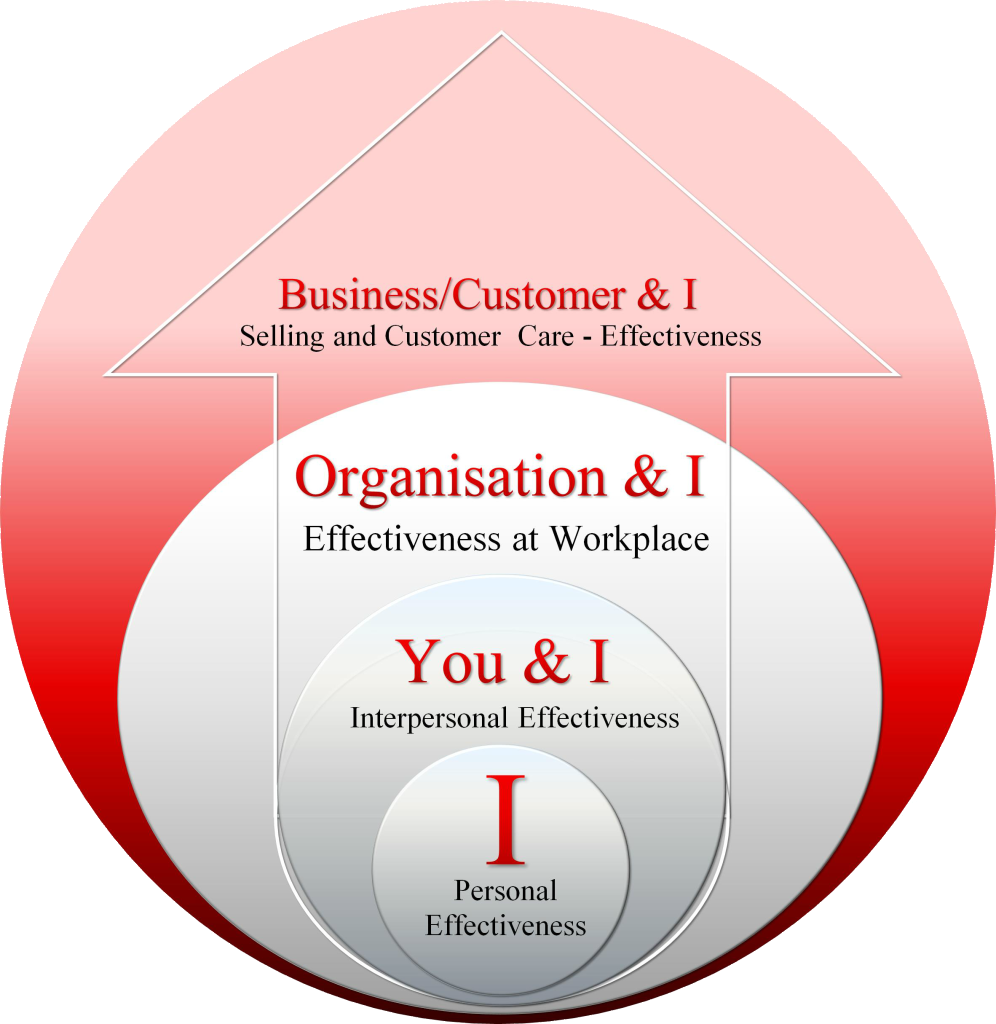Training is a definite value enhancer when it is supported by professional education as in ‘learning to know and learning to do’.
Training and development is our key focus area where we customize applications based on the CAP theory (concept, application and process) in developing people strengths.
- Soft skills (Saubhya – Sushil)
- Knowledge and skills development (Sakshar – Saksham)
- Leadership and team building (Shaktivan)
- Corporate leaders and decision makers (Chakravyuha – Manthan)
- Problem solving (Santulan)
- Good health, values and high morale (Saubhagya)
- Performance management (Karamphal)
- Mergers and Acquisitions (Swayamvar)
Customized corporate training programs – hridai
The value proposition
We work on four dimensions approach for organizational effectiveness. One, we facilitate a learning environment where people can do self analysis and can explore their hidden potential i.e. personal effectiveness. Two, we enable people to relate with each other more effectively and sharpen their skills for interpersonal effectiveness. Three, we facilitate a learning environment where we empower people to work more effectively at the work place and four we enable people to relate with the external customers for “customer delight”.
Our approach – Program life cycle
The approach for the program comprises of three phases;
Need analysis
We work very closely with the team to identify training needs and objectives, gather relevant data of the participants and customize our program to suit the participants expected objectives.
Program delivery
We deploy the best training manpower resources to ensure that the delivery of the customized contents is as per expected objectives.
Programs fed back & follow up
We have a comprehensive system whereby we take feedback from all participants post program and also keep the group in regular communication to understand / evaluate their progress from the program. This process helps us to continuously improve our program life cycle and do better value addition in our future programs.
Our methodology:
Extensive use of the state-of-the-art education techniques in training programs for people transformation, especially Neuro-Linguistic Programming (NLP) an approach used to do organizational change based on a model of interpersonal communication chiefly concerned with the relationship between successful patterns of behavior and the subjective experiences (esp. patterns of thought) underlying them. This seeks to educate people in self-awareness and effective communication and to change their patterns of mental and emotional behavior. It involves:
- Instructor Led Sessions
- Discovery Learning through CAD (Case Analysis & Discussion) and Counseling (One-on-One coaching)
- Experiential Learning through Role Plays and Situational Replays
The following picture depicts the transition which takes place during the behavioral transformation.

Contents of Organizational Transformation: From Inside – Out
Saksham Personal Effectiveness (PE- 40 hours)
- Create stronger emotional connections with our relations.
- Manage expectations of self and others and identify areas of strength and potential improvements.
- Nurture relationships.
- Define, develop, implement and exploit our own potential by developing positive thoughts, beliefs and actions.
- Identify the ways to implement our renewed understanding of self and others towards successful customer experience.
- Discuss goal-orientation as the key to structure and meaning in life.
- Identify the relation between goals and success.
- Identify the components of an effective goal.
- Identify the roadblocks in achieving goals and defining a path towards achieving it.
- Identify the key skills, attitudes and behaviors that help achieve personal effectiveness that in turn helps to achieve goals.
– Become aware of one’s personal values and ethics and understand their importance in reaching the goal.
– Become aware of the strengths and weaknesses vis-à-vis the goal.
– Manage time to become more effective in journey towards the goal.
– Manage stress due to interpersonal and organizational relationships.
– Managing change
Sarvodhaar I and You: Interpersonal Effectiveness (IPE- 48 hours)
- Analyzing the communication as a process.
- Define, what is transactional analysis?
- Identify how TA helps in effective communication.
- Identify why conflicts arise and how they can be resolved.
- Listening Skills
- Speaking: Probing
- Explain, identify and display the skills, attitudes and habits for demonstrating
– Assertive Communication
– Influencing Skills
– Group Discussion
– Presentation Skills (one-one; one-many)
– Negotiation Skills
- Carry out written business communication professionally.
- Handle incoming and outgoing telephone calls professionally.
Organization and I: Adapting to Workplace – 8 hours
Shishtachar: Business Etiquettes
- Recognize the boundaries between personal and professional lives.
- Define appropriate conduct at workplace and demonstrate its importance.
- List ways to effectively conduct yourself at business meetings.
- Employ mobile phone etiquette at the workplace.
- Identify the importance of good etiquette in client meetings.
Samagrahi: Working in a Team
Concept of a Team
- Explain the concept of a team.
- Identify the steps in team formation.
- Identify the characteristics of an effective team.
- Identify the building blocks of an effective team.
- Identify the characteristics required in a good team member.
Building Effective Teams
- Identify the building blocks of an effective team
- Identify the characteristics required in a good team player.
Customer Orientation and Business Skills
Sushil: Business / Customer and I
Understanding Customer Behavior (UCB- 16 hours)
- Identify the difference between a consumer and a customer.
- Define consumer behaviour and the factors influencing it.
- Discuss the influence of culture, sub-culture, cross-culture and social class on consumer behaviour.
- Discuss the impact of reference groups on consumer behaviour.
- Identify the importance of economic circumstances, occupation, age and lifestyles on consumer behaviour.
- Discuss the impact of personality, self image and learning on consumer behaviour.
- Describe the influence of motivation, attitude and perception on consumer behaviour.
- Differentiate between the various types of buying behaviours.
- Knowing our customer and customer service.
- Identifying the pillars of customer service.
- Develop a service mentality.
- Demonstrate proactiveness at work.
- Demonstrate assertiveness and empathy.
- List types of customers and ways to handle them.
- Identify the role of one-to-one customer relationship management in customer retention.
- Identify the importance and the process of handling customer complaints.
Daksh Effective Selling Skills (ESS -24 hours)
- Opportunity management
- Pre-sale Preparation for competitive market
- Understanding Selling & Buying.
- Building repo by impressive ‘Interaction’.
- How to develop ‘Need’ and know ‘Demand’ for the sale.
- How to manage customer expectations
- How to represent “the right” solution.
- How to handle doubts.
- How to close a sale effectively.
- Manage Post-sale Customer Satisfaction
- How to Care for Customer: Retention skills for repeat business and to generate referrals.

Programs for Organizational social cause
At hridai, ‘people’ are the heart of the matter that concerns us. We have observed that progressive organizations not only take care of their People, they also extend their arms and resources to serve identified social causes. We join hands with the organizations for such initiatives through a set of our training programs. Our programs are targeted to empower people with skills based/ employ ability linked vocational programs in varied age groups. Following are the list of programs series available;
Daksh series:
- Communication skills Level 1 – Basic
- Communication skills Level 2 – Advanced
- Presentation skills
Saksham series
- Personal effectiveness skills -for support members – office boys/ peons/ ward boys/drivers
- Customer excellence management
- Retail management
Saubhagya series
- Good health values and high morale
Training workshops
We also conduct specialized workshops for professionals which are steered by the top management team of hridai. The workshop of 1-2 days duration includes programs on leadership skills (saktivan), Challenges before Corporate leaders and decision makers (chakravyuha-manthan), Performance management ( karamphal)
Our Trainers:
Our team of certified trainers having a rich industry experience and are academically qualified to conduct the training, facilitation and consultancy through best practices as per industry acclaimed international standards of training and delivery methodology.
